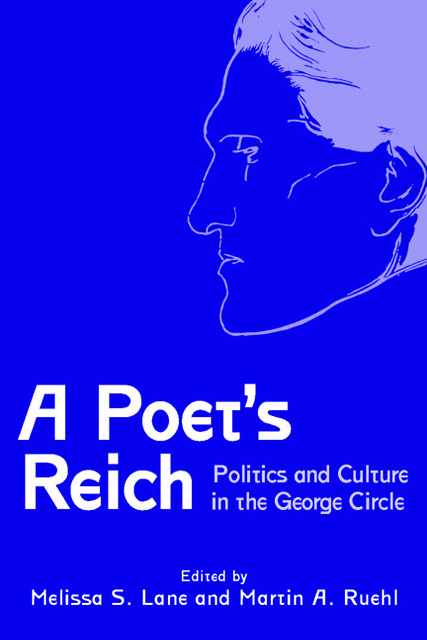13 - Stauffenberg: The Search for a Motive
Published online by Cambridge University Press: 10 February 2023
Summary
When Stefan George Is Discussed Today outside the seminar rooms of German departments, it is usually in the context of Claus Schenk Graf von Stauffenberg. At the end of his expansive study Secret Germany: Stefan George and His Circle, Robert Norton, too, touches on Stauffenberg and his plot to assassinate Hitler. Having devoted more than seven hundred pages to demonstrate, with the zeal of an inquisitor, that a direct line led from George to Hitler, Norton’s decision to conclude his book with a portrait of Stauffenberg seems somewhat puzzling. It is by no means clear why Stauffenberg, who had been passionately committed to George since the age of fifteen and who ranked amongst the most faithful custodians of his Master’s legacy, should decide, ten years after the latter’s death in 1933, to kill, of all people, the man whose policies, according to Norton, represented the realization of George’s prophecy. Norton himself, in fact, seems slightly confounded by this paradox, as is evident in the final sentences of his book: “To the end, then, Stauffenberg remained loyal to the ideals he had learned from Stefan George. We will never know if Stauffenberg ever considered whether those ideals themselves, and the man who had preached them, had helped to create the one he tried to destroy.”
In the summer of 2007, Stauffenberg became the center of public attention in the run-up to the release of a Hollywood blockbuster based on the events of the 1944 bomb plot starring Tom Cruise. When the film finally reached the German screens in January 2009, the Cambridge historian Richard Evans was one of the first to question the motives that informed the actions of Stauffenberg and his fellow conspirators in “Operation Valkyrie,” the code word that lent the picture its title. In an article for the magazine supplement of the Süddeutsche Zeitung, a leading German daily, published on 23 January 2009, Evans observed that Stauffenberg’s assassination attempt was inspired by the neo-Romantic ideals of Stefan George — ideals, he pointed out, that were already long defunct in 1944. According to Evans, Stauffenberg’s belief that Europe could exist only under German leadership was as anachronistic as his desire for the restoration of a corporate state.
- Type
- Chapter
- Information
- A Poet's ReichPolitics and Culture in the George Circle, pp. 317 - 332Publisher: Boydell & BrewerPrint publication year: 2011

